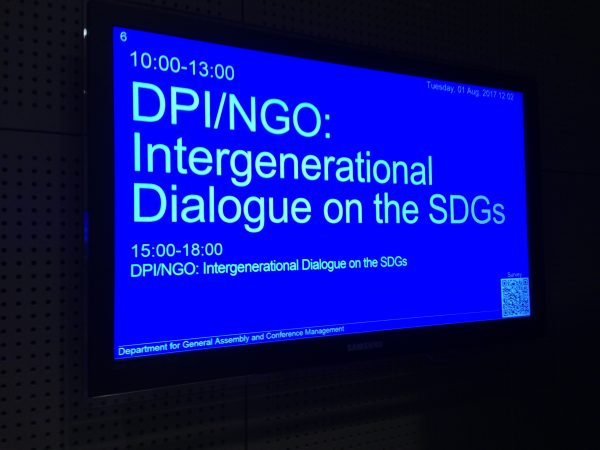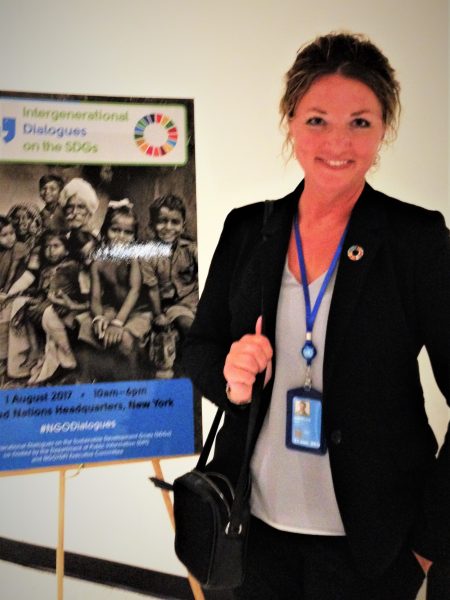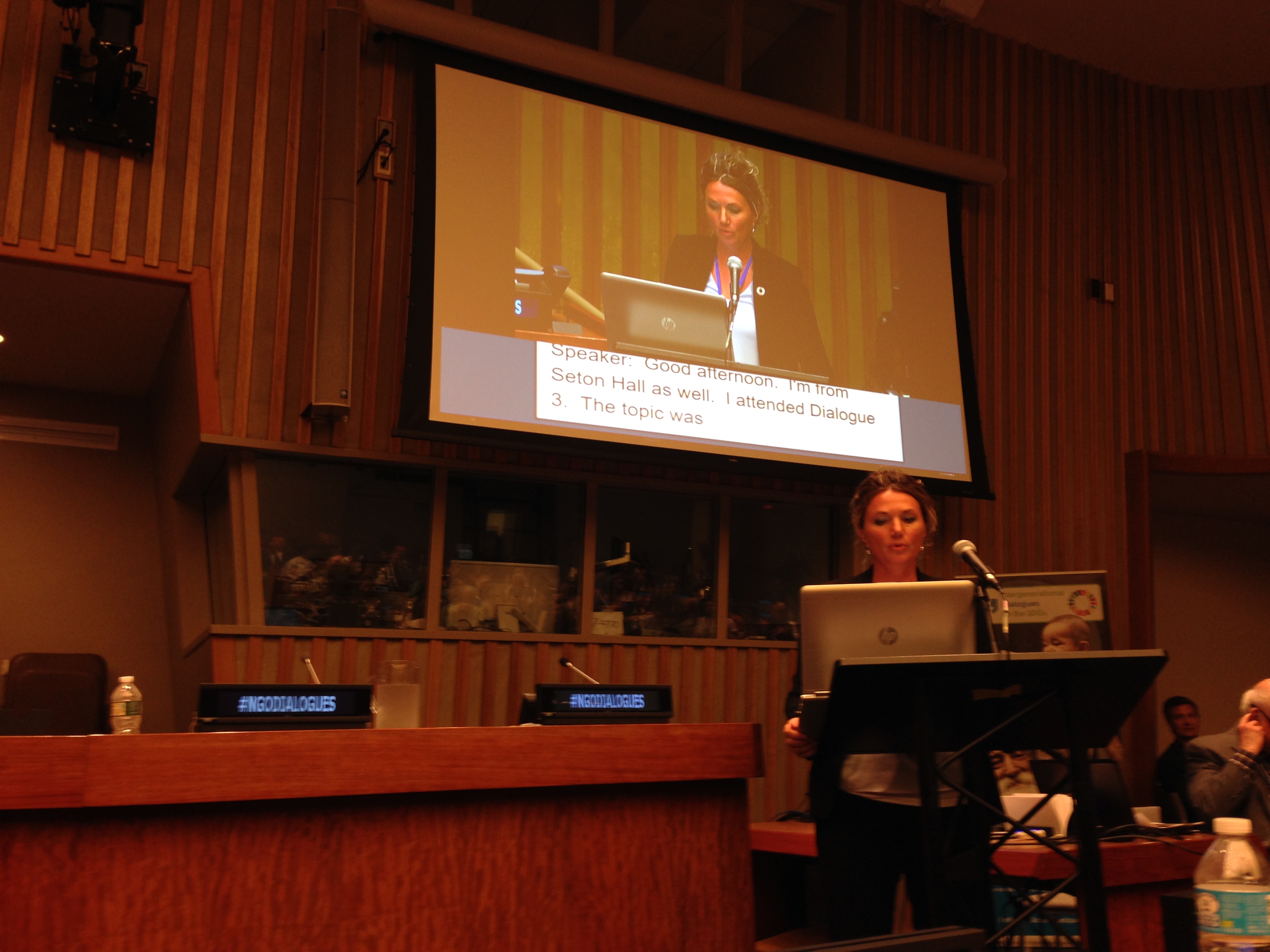This guest post was written by Vera Dimoplon. Vera is a second-year graduate student at the Seton Hall School of Diplomacy and International Relations. Vera serves as a representative of the Center for UN and Global Governance Studies at the United Nations and specializes in International Organizations and Negotiations.

Early in the morning of 1 August 2017, I arrived in Manhattan on a NJ commuter train like I usually do when I attend United Nations (UN) events and meetings. However, it was not an ordinary day. It was a day I was appointed to serve as a Rapporteur for the Intergenerational Dialogues on Sustainable Development Goals (SDGs) Event. Organized by the UN Department of Public Information (DPI) Non-Governmental Organizations (NGOs) and co-hosted by DPI and NGO/DPI Executive Committee, this meeting sought to promote intergenerational cooperation and development of an intergenerational agenda for future collaboration. Walking to the UN, I saw people in their usual morning routine and I kept wondering if they knew of the event that I was going to attend that day. I always wonder how much do people know about the United Nations and its importance for the international community. That morning, I wanted to share with every person on the street how excited I was to be a part of such an important meeting. Instead, I walked through Manhattan to the place which captivates and fascinates me every time with its singular ability to bring the world together and make an impact: UN.
Message from United Nations Secretary-General Antonio Guterres
Message from United Nations General Assembly President Peter Thomson

My role as a Rapporteur was to attended the Dialogue 3: Access to Employment Throughout Life, record the points of agreement and disagreement among generations regarding employment, as well as highlight what areas of intergenerational partnership were developed during these dialogues. There is no separate SDG for Employment. Being a part of several Sustainable Development Goals (SDG4, SDG5, SDG8, SDG9, SDG10, SDG17), employment is woven into the process of delivering quality education, ensuring gender equality, creating meaningful job opportunities, promoting innovation, and creating partnerships throughout the international community.
I attended both, morning and afternoon sessions of the Dialogue 3: Access to Employment Throughout Life. At the end of the day, I had to summarize all the point and produce a report. I presented my report at the Closing Plenary and submit my report to be included into the official UN document on intergenerational collaboration.
Edward Ryan, Moderator
Senior Legislative Advocate, AARP Pensylvania Volunteer and Former Representative of AARP to the United Nations Department of Public Information
Bruno RÍos Sánchez
Second Secretary, Permanent Mission of Mexico to the United Nations
Mariama Camara
Co-founder, There Is No Limit Foundation
Kevin Cassidy
Senior Communications and External Relations Officer, International Labour Organization
Jack Kupferman
Senior Attorney, NYC Deartment of Ageing
Both, morning and afternoon sessions of the Dialogue 3 revealed that the youth and the older generation are looking for ways to collaborate innovatively and create intergenerational synergy. Participants of both sessions emphasized the need to continue intergenerational dialogues at all levels (international, regional, local) and to develop projects that promote such partnership. The moderator asked the audience members to offer suggestions for opportunities leading to positive solutions for the SDGs.
Quote by Edward Ryan, the Moderator “we seek positive opportunities”.
Key issues for the youth:
- Gender issues are still very real, especially in developing countries (primarily, girls have fewer opportunities to access quality education and, as a result, secure stable employment in the future);
- Quality education in industrial countries comes with a high price and leaves graduates with great financial debts;
- Jobs are not always available to graduates to apply the skills they studied for. It takes 3-5 years to find a job that relates to the field of studies. As a result, graduates depend on their families to support them or work elsewhere while they look for their dream job;
- Concept of “tasks” vs “jobs”: Young people often have to handle many tasks that are not linked to specific jobs (being outsourced). As a result, the youth does not have a chance to develop job-specific skills that would help them secure a stable employment.
- Finding a secure and sustainable job;
Key issues for the older generation:
- Gender hasn’t been reported to be an issue among older generation;
- Important point was raised: each person’s ability to work and be productive varies for each individual (example: some people can work until they turn 100, others have limitations at age 25);
- Technology and retraining are often perceived as a barrier for older generations to get a job;
- People who are 60-80 years of age want to continue to work, but are often turned away because of their age;
- Other representatives of this group would prefer to stop working and attend to other issues of their life, but cannot afford to do so due to various factors;
- Being let go because a younger person could work for less;
Commonalities between the two groups:
- Age discrimination has been reported by both, the youth and the older people;
- Both, the youth and the older people are concerned about being able to secure social protection and retirement;
- Both sides report experiencing job insecurity due to various factors (merging corporations, machines replacing human jobs);
- Both sides want to invest in new skill development;
- Both sides want to continue to learn throughout their life;
- Both, youth and older generation want to have meaningful opportunities;
- Both sides see the need to break stereotypes and myths about each other;
- Both, the youth and the older people seek income security;
- Both want to break poverty cycle and include people with disabilities into job opportunities;
- Unequal compensation for the same set of skills across the globe (example: industrial countries pay more than developing countries for the same skills and provide better benefits to their employees);
Intergenerational issues (differences) Ed Ryan, the Moderator pointed out that Henry Ford once said: “Don’t find fault, find a remedy”:
- How do you find a balance between one generation retiring before feeling unwelcome and the other generation stepping in before having enough expertise?
Proposed framework for intergenerational partnership:
- Move away from the stakeholder model back to the shareholder model where people would take more ownership in what they do;
- Invest in education and skill development, but do so equally throughout the global community;
- Promote a socially inclusive environment for all;
- Create mentorship on both sides;
- Sustainable collaboration between the youth and the older generation;
- Volunteer in NGOs;
- Enforce labor unions and cooperatives to protect the rights of people and prevent human rights violations;
- Attract young children to be a part of the UN community;
- Kevin Cassidy, Senior Communications and External Relations Officer, International Labour Organization, provided a wakeup call by saying 45 million young people will be entering the work force each year and identified 4 pillars for successful intergenerational collaboration:
- The need for international standards and norms (conditions, non-discrimination, skills and talents)
- Employment creation
- Communication in the work place (benefits, productivity)
- Social protection- not just social security or its equivalent (lifecycle approach: school, retraining, loss of jobs in a place that you live, retraining older people, saving for retirement);
I wanted to finish my blog with a quote by Jack Kupferman, panel speaker for my Dialogue “When people have a common purpose, age does not matter. Create more opportunities for youth and elderly to have common projects which will bring them together.”

As I was getting on the train that night, I was reflecting on how powerful it feels to be a part of the international community. I was remembering beautiful faces of people from all over the world whom I met at the event. Each of those people came to the UN to work together under one initiative and take this experience to various parts of the world, where these ideas would be implemented. I was one of those people.
It was an honor to serve as a Rapporteur for the Intergenerational Dialogues on SDGs. To me, it meant to be a part of the UN community, the only community on Earth that can empower people to make a global impact. It allowed me experience what UN Rapporteurs do in the field and provided me with valuable connections, which I will cherish throughout my professional career.
-Vera Dimoplon

Reading this in 2023 after being apointed as rapporteur for an “International Conference on Environment and Biodiversity Conservation” is so refreshing. Thank you, Vera!
I just went through this and i love it. Interesting read!
Great experience, I think you will move the world if you could summarize the event with so much accuracy. Congratulations
The sky is not your limit but actually your beginning. Well done.
Great write-up Vera.
Russians! I am so incredibly proud of you and all you have accomplished. It’s incredible to think of that little office we once sat in together in Kazakhstan. Moladyets this is amazing and written in a way that really speaks to people with a solution and not just a fundamental global issue. You are an amazing woman and look absolutely stunning.
Great article, Vera!